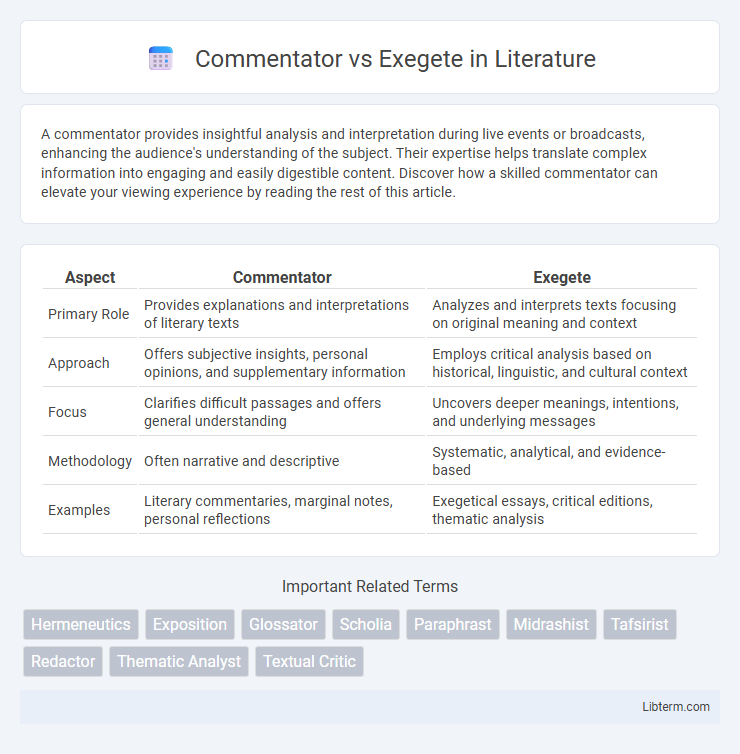A commentator provides insightful analysis and interpretation during live events or broadcasts, enhancing the audience's understanding of the subject. Their expertise helps translate complex information into engaging and easily digestible content. Discover how a skilled commentator can elevate your viewing experience by reading the rest of this article.
Table of Comparison
| Aspect | Commentator | Exegete |
|---|---|---|
| Primary Role | Provides explanations and interpretations of literary texts | Analyzes and interprets texts focusing on original meaning and context |
| Approach | Offers subjective insights, personal opinions, and supplementary information | Employs critical analysis based on historical, linguistic, and cultural context |
| Focus | Clarifies difficult passages and offers general understanding | Uncovers deeper meanings, intentions, and underlying messages |
| Methodology | Often narrative and descriptive | Systematic, analytical, and evidence-based |
| Examples | Literary commentaries, marginal notes, personal reflections | Exegetical essays, critical editions, thematic analysis |
Introduction: Understanding Commentators and Exegetes
Commentators analyze and interpret texts, providing explanations that clarify meaning and contextualize content, often simplifying or elaborating for broader comprehension. Exegetes engage in critical interpretation focused on uncovering deeper, often theological or philosophical, meanings within a text through rigorous textual analysis. Both roles contribute to enhanced understanding, with commentators emphasizing practical elucidation and exegetes prioritizing in-depth scholarly interpretation.
Defining Commentary and Exegesis
Commentary involves interpreting and explaining a text by providing insights and explanations that clarify meaning, often addressing historical context, language, and application. Exegesis is a critical, systematic process aimed at uncovering the original meaning of a scripture or document by analyzing its linguistic, cultural, and theological context. While commentary often expands upon exegesis with interpretation for contemporary understanding, exegesis remains focused on the text's original intent and accurate interpretation.
Historical Background of Commentators
Historical commentators emerged during the early medieval period as scholars dedicated to explaining classical texts, bridging the gap between ancient writings and contemporary audiences. Rooted primarily in the traditions of Greek, Roman, and later Islamic civilizations, these commentators preserved and interpreted philosophical, religious, and literary works, often employing allegorical or literal approaches. Their efforts laid foundational groundwork for exegetical methods, influencing the systematic and critical analysis of texts in later centuries.
Origins and Development of Exegetes
Exegetes originated in ancient religious traditions, particularly within Judaism and early Christianity, developing specialized methods for interpreting sacred texts by analyzing language, context, and cultural background. Their role expanded through the Middle Ages with scholars like Origen and Thomas Aquinas, who systematized hermeneutics and biblical scholarship, shaping exegetical frameworks. The development of exegetes continued with the Enlightenment's emphasis on historical-critical methods, establishing exegetes as pivotal figures in theological and literary analysis.
Methodologies Used by Commentators
Commentators primarily employ a methodical, text-focused approach centered on elucidating the literal and contextual meanings of scripture through linguistic analysis, historical context, and tradition. They emphasize explaining verses line-by-line, often synthesizing classical interpretations and addressing ambiguities in vocabulary and grammar. This methodology contrasts with exegetes who may integrate broader theological, philosophical, or ideological perspectives to interpret the underlying principles and implications of the text.
Exegetical Approaches and Techniques
Exegetes employ various interpretive methods such as historical-critical analysis, linguistic examination, and theological reflection to uncover the original meaning of texts within their cultural and historical contexts. Techniques like textual criticism, source criticism, and rhetorical analysis enable exegetes to delve deeply into scripture, identifying authorial intent and contextual nuances. This methodical approach distinguishes exegetes by their focus on rigorous, scholarly analysis rather than mere commentary or personal interpretation.
Primary Objectives: Commentary vs Exegesis
Commentators aim to provide clear explanations and interpretations of texts, often focusing on practical applications and contextual understanding for contemporary audiences. Exegetes seek to uncover the original meaning and intent of the text through detailed linguistic, historical, and theological analysis. Commentary emphasizes accessibility and readability, while exegesis prioritizes scholarly rigor and fidelity to the text's original context.
Role in Religious and Literary Traditions
Commentators analyze texts by providing explanations and interpretations that clarify meaning for contemporary audiences, often focusing on language, context, and thematic elements within religious and literary traditions. Exegetes engage in critical and systematic interpretation, delving deeper into the original intent, theological implications, and historical context of sacred or literary texts. Both roles are essential for preserving, understanding, and transmitting the nuanced significance of classical writings across generations.
Impact on Interpretation and Understanding
Commentators provide explanations that clarify the text's surface meaning, often bridging cultural and historical gaps for contemporary readers, thus enhancing immediate comprehension. Exegetes delve deeper into the original context, linguistic nuances, and theological implications, offering an authoritative interpretation that shapes doctrinal understanding. The impact of commentators lies in accessibility and practical application, while exegetes influence foundational interpretation and scholarly discourse in religious studies.
Key Differences: Commentator vs Exegete
A commentator offers detailed explanations and practical interpretations of a text, often focusing on clarifying meaning and providing context for better understanding. An exegete delves deeper into the original language, historical background, and theological implications to uncover the underlying intent of the author. While commentators emphasize accessible interpretation, exegetes prioritize critical analysis and scholarly study of the source material.
Commentator Infographic

 libterm.com
libterm.com